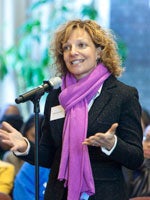“Put yourself in the path of lightning,” was the advice of Senior Advisor to the President Valerie Jarrett, speaking at the Harvard Law School Women’s Law Association spring conference on February 19, 2010.
Entitled “Women for Women: Advocating for Change,” the conference brought together leaders in the legal profession to discuss the challenges that women face in the courtroom, the workplace, and in the community.
Jarrett, who began her career at a law firm in Chicago, spoke about her decision to move from private to public sector. She said she made the decision to work for Chicago Mayor Harold Washington because she thought, “I think I will feel like I’m a part of something bigger than just myself.” Joking that her mother couldn’t understand why she was moving from an office in the Sears Tower to a tiny cubicle in the back of a dingy city office, Jarrett said it was a career move that worked well for her—she stayed in Chicago city administration through three mayors.
Although public service can be a difficult career, Jarrett said, she has not regretted her decision to work in government and she encouraged the hundreds of students in the audience to work in public service at some point in their careers. “I think it gives you a chance to see a different perspective and to serve,” said Jarrett. “It’s not for everyone, and it’s certainly not for the faint of heart…but I will say to you that my worst day in the public sector was really better than my best day in the private.”
A headline-maker for her close personal relationship with the Obama family and for her influential role in the White House, Jarrett said that the one lesson the audience could learn from President Obama is to “shoot for the stars.”
“I suppose President Obama is the best example of that,” said Jarrett. “There were many, many, many people, myself included, who said to him, you are absolutely crazy to make this run for President. But, miracles do happen, so don’t shoot low – shoot high. It’s ok if you fall a little short.”
A graduate of Stanford University and the University of Michigan Law School, Jarrett is one of three Senior Advisors to President Obama. She oversees the White House Office of Public Engagement, the Office of Intergovernmental Affairs, the Office of Urban Affairs, and she chairs the White House Commission on Women and Girls and also the White House Office of Olympic, Paralympic, and Youth Sport.
Closing the conference was the second keynote speaker, Illinois Attorney General Lisa Madigan, who became the first female to hold that position when she was first elected in 2003.
Madigan discussed two “defining moments” that inspired her to go to law school and to run for public office. First, as a college student at Georgetown University, she had the opportunity to work for Illinois Senator Paul Simon, who had a “need to work to change the world” that she said was infectious.
“Once you spend time around people that truly believe that they can have an impact and make a difference… it changes you,” said Madigan. “The lesson of Paul Simon’s leadership is that not only can you have a real impact on the world and for other people, but you also have an obligation…to use your skills to try to have that impact, to try to make those changes.”
That experience, Madigan said, encouraged her to go to South Africa after college to teach when the country was sill under Apartheid. Her students gave her the perspective to understand that although she may have difficulties in life, none would be as great as what her students and their families faced under Apartheid, she said. “As much as I taught them, they taught me much more.”
After attending law school and working in private practice, Madigan took a leave of absence to run for the Illinois state senate. “I decided that if I ran for public office, if I was part of government, if I was a public servant, I could do more to help people,” she said.
Madigan won her state senate race and after four years in the state senate she decided to run for attorney general. “I’m the managing partner of the state’s largest public interest law firm,” she said. She described numerous policy efforts her office is undertaking to prevent violence against women, including a new stalking law, the enforcement of orders of protection, and making sure that all rape kits are properly tested and recorded.
“My office helps people,” said Madigan. “There really is for me nothing more rewarding than knowing that the work that I do and the hard work that my dedicated lawyers and staff do every single day makes a difference.”
The issues women face in employment were the focus of a panel entitled “Change in the Workplace.” Panelists included: Alayna Buckner, chair of the Women’s Information Network; Sara Gould, President and CEO of the Ms. Foundation for Women; Sharon Jones ’82, president of O-H Community Partners; Marni Lerner ’91, partner at Simpson Thacher & Bartlett; Jerri Shick, counsel at O’Melveny & Meyers; and Kim Taylor, partner at Kirkland & Ellis.
Among the topics covered: why there are so few female partners in law firms, how women can work together to promote one another’s work, and how young women starting their careers in the law can become successful agents of change in the workplace.
